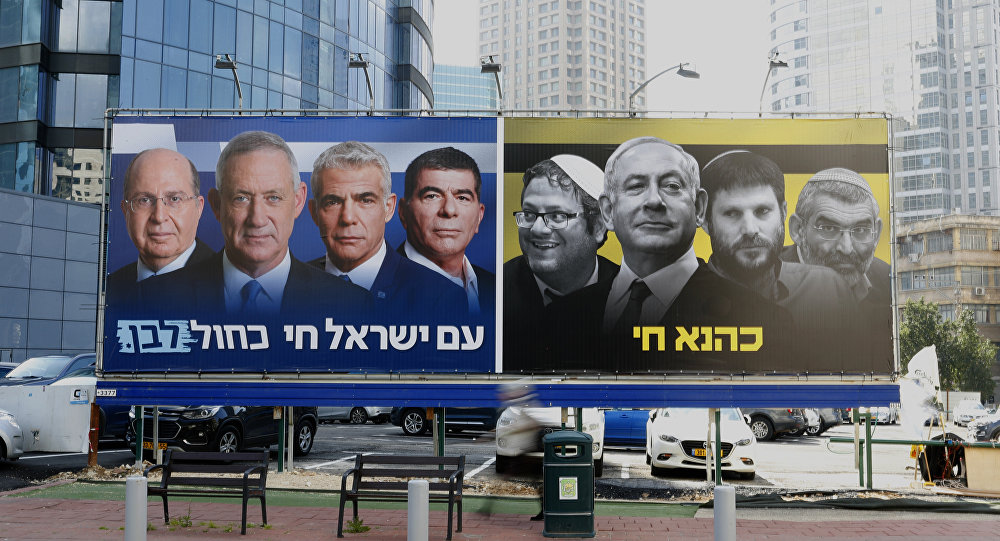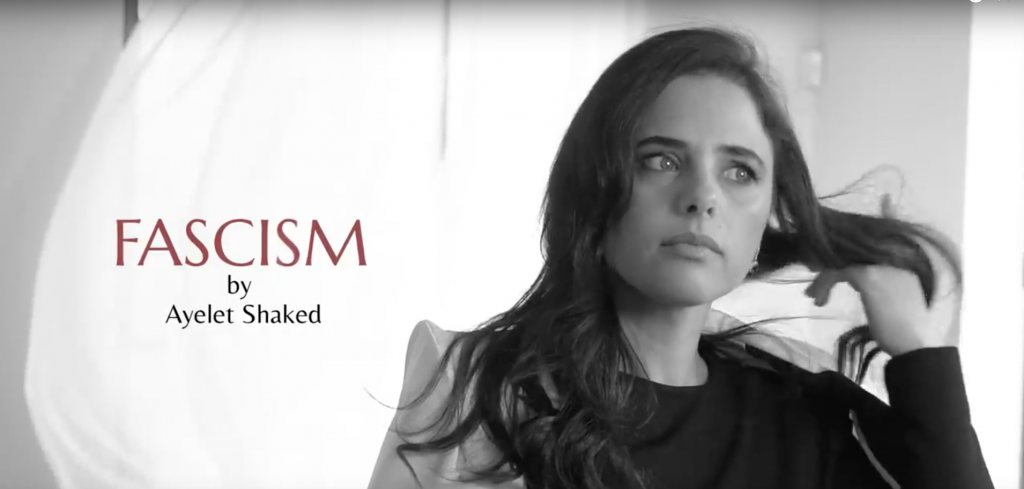Australia/Israel Review
Bibi vs. Benny
Mar 27, 2019 | Ahron Shapiro

Inside Israel’s raucous election campaign
Israel’s multiparty system, which sets the threshold for a party to enter the 120-seat Knesset at four seats, or 3.25% of the vote, tends to attract a large crop of niche parties every election season.
History has shown that in a close election, even four seats can make a small party the kingmaker in coalition talks and a significant player in the next government. In 2009, 33 parties ran for the Knesset – a record until now – 12 of which entered parliament. This year’s field of 47 parties, all vying for votes in the election scheduled for April 9, shatters that record. Despite the greater number of contenders, most polls suggest the number of parties that will cross the threshold will, once again, hover around a dozen.
With competition this fierce, how each party chooses to campaign – the issues it chooses to raise, the messages it transmits to the public and the form those messages take – have a tremendous impact on its fortunes. It begins with the core messaging – the choice of campaign slogans. Then, there is the matter of what issues to raise on their posters, jingles, commercials and social media videos.
Will their campaign messaging be positive, asking for a vote based on campaign promises to deliver better outcomes on a variety of issues? Will their campaign messaging be negative, tearing down a competing politician or party vying for the same type of voters? Or will the campaign theme and messaging be mixed, with separate positive and negative ads released at the same time?
As Israel’s election day approaches, what are the themes being employed by the parties so far? It’s important to note that such themes are rarely static throughout a campaign, and an issue that was high on a party’s agenda early in the campaign is often replaced overnight in response to current events.
These sort of campaign-shifting events can be external and unpredictable, such as a deadly terror attack in the West Bank, as we saw on March 17, or the Hamas rocket attack on Tel Aviv on March 14. It can also be affected by other wildcards – like Attorney-General Avichai Mandelblit’s Feb. 28 announcement that he intended to indict the Prime Minister on corruption charges in three cases, the March 14 report that Blue and White party leader Benny Gantz’s phone had been hacked by Iranian intelligence, and US President Donald Trump’s March 21 decision to recognise Israeli sovereignty over the Golan Heights.
What remains constant is that the messaging in a party’s campaign may sometimes hardly reference its platform and, indeed, selectively ignore certain aspects of the platform entirely – decisions often based upon polling data or focus groups.
Here, the parties will be discussed in order of their popularity based on a recent poll by the Israeli national broadcaster Kan, published on March 17. In the interests of space, dozens of parties that most polls agree have no chance of succeeding will not be examined. Israel’s official campaign television commercials, which are aired at prime time before every election and are considered highly influential, only began airing on March 26, after this issue went to press, and are not considered here.
Likud (20th Knesset – 30 seats, Kan poll – 31 seats)
Likud has tried something new in this year’s campaign. Playing into Prime Minister Binyamin Netanyahu’s contention that Israel’s media is working against him, the party has decided to produce its own Facebook and YouTube-hosted news program “LikudTV”, reporting from a Likud perspective and featuring interviews with the party’s various politicians. Judging from the number of views, the program has had limited appeal.
 Likud’s messaging so far has been to focus on Netanyahu as a leader that’s “right-wing, strong, and successful”.
Likud’s messaging so far has been to focus on Netanyahu as a leader that’s “right-wing, strong, and successful”.
The Likud has cultivated anti-media sentiment as a campaign theme in itself, embodied in posters along major highways that show the portraits of several prominent Israeli journalists with the caption underneath: “They won’t decide. Only you will decide. Davka (meaning roughly “especially, contrary to what they want”) Netanyahu!”
Likud’s most-watched campaign videos have been delivered in short, 15-second clips and have been largely attack ads against its main competitor, Benny Gantz and Yair Lapid’s Blue and White party. These clips end with a diametrically opposite slogan to Netanyahu’s – “Lapid and Gantz. Left-wing. Weak.” – while the ones that rebut the corruption allegations end with the slogan “The Netanyahu investigation = A political assassination attempt.”
In late February, Netanyahu added some positive messaging to the mix with two new commercials on his YouTube channel touting his government’s achievements in security, economy, tourism and diplomacy: One, with a serious theme, the other a whimsical sequel to a slapstick video from the last election, featuring Netanyahu playing the straight man to a flustered, high-strung aide.
Blue and White (20th Knesset – 11 seats (Yesh Atid), Kan poll – 30 seats)
The new Blue and White (Kachol Lavan) party’s messaging is complicated by the very factor that makes it a realistic competitor to Netanyahu. Namely, that is is the product of merger between two mid-sized parties: Gantz’s new Resilience for Israel (Hosen L’Israel) party and Lapid’s existing Yesh Atid party.

According to analysts, the party’s top leaders – which also include former IDF Chiefs of Staff Gabi Ashkenazi and Moshe Ya’alon – came to the merger with their own ideas of how the campaign should be run. As a result, with the exception of a common slogan “Israel [comes] before everything”, the party’s ads have lacked cohesion.
Two Blue and White videos stand out: In the first, Yair Lapid combined negative with positive messaging in a creative and appealing way. Standing in front of a mountain of cash he claimed was poorly spent by the Netanyahu government on things like a private plane for the prime minister and placating rogue MKs, Lapid proceeded to redistribute the money into boxes to fund a variety of campaign promises – health, education, roads, etc.
In the second video, the party’s leaders produced their first effective joint video that, in 50-seconds, burnished the security credentials of the party chiefs while hammering Netanyahu with Blue and White’s critical campaign talking points.
The video criticised Netanyahu for his policy of transferring Qatari funds to Hamas to maintain quiet on the southern border; his response to a major Hamas rocket barrage last November; his willingness to work with far-right politicians, including supporters of the late racist demagogue Rabbi Meir Kahane; and the indictments for corruption hanging over his head.
“Enough,” the party leaders say in the video. “Thank you for ten years. We’ll continue from here”. Gantz, as party leader, is given the last word: “I will continue from here because Israel [comes] before everything.
Labor (20th Knesset – 24 seats (Zionist Union), Kan poll: 9 seats)
 Under the slogan “Returning to the path, returning to Labor”, Avi Gabbay’s Labor party has focused its campaign messaging on recouping the party’s supporters from the last election. At that time, Labor’s then-leader Isaac Herzog benefitted greatly electorally as Netanyahu’s main challenger. Today, even Gabbay himself has admitted that role is being filled by Gantz.
Under the slogan “Returning to the path, returning to Labor”, Avi Gabbay’s Labor party has focused its campaign messaging on recouping the party’s supporters from the last election. At that time, Labor’s then-leader Isaac Herzog benefitted greatly electorally as Netanyahu’s main challenger. Today, even Gabbay himself has admitted that role is being filled by Gantz.
Nevertheless, Labor has exploited Blue and White’s amorphous centrist ideology to attempt to convince some of the “anybody but Netanyahu” voters – who voted with Labor in 2015 but have now shifted their allegiance to Gantz as the frontrunner – to reconsider. To that end, Labor has campaigned on two messages: Firstly, that Blue and White, despite its claims of being devoutly centrist, is essentially a right-wing party based on the statements of its leaders, and secondly, that – even if you believe it is centrist – voting for Blue and White “opens the door” to a right-wing coalition because “only a strong Labor ensures a government of change”.
Hadash/Ta’al and Balad/UAL (20th Knesset – 13 seats (Joint List), Kan poll – 8 and 4 seats, respectively)
 Leaders Ayman Odeh (of the Arab and Jewish communist party Hadash) and Ahmed Tibi (Ta’al), part of the former fractured Joint List with Balad and the United Arab List (UAL), have promised to be a vigorous opposition to any “right-wing” government – and in their view, right-wing includes Gantz. In keeping with their contrary nature, the party has provocatively chosen the campaign slogan “flocking to the polls”, with images of buses behind the politicians, a clear reference to a controversial video Netanyahu released on Election Day 2015, when he urged Likud supporters to vote because Arabs were supposedly flocking to – and being bussed to – the polls.
Leaders Ayman Odeh (of the Arab and Jewish communist party Hadash) and Ahmed Tibi (Ta’al), part of the former fractured Joint List with Balad and the United Arab List (UAL), have promised to be a vigorous opposition to any “right-wing” government – and in their view, right-wing includes Gantz. In keeping with their contrary nature, the party has provocatively chosen the campaign slogan “flocking to the polls”, with images of buses behind the politicians, a clear reference to a controversial video Netanyahu released on Election Day 2015, when he urged Likud supporters to vote because Arabs were supposedly flocking to – and being bussed to – the polls.
Balad (led by Mtanes Shehadeh) and the UAL (led by Mansour Abbas) lack the small number of Jewish supporters backing Hadash and the broader Arab base of Ta’al, but the ideological differences between Israel’s Arab parties are beyond the scope of this article. However, for political purposes, since they ran together in 2015 and as non-Zionist Arab parties they campaign on similar issues – mainly to advocate for the unique interests of their various constituents among Israel’s Arab population – they have been addressed collectively here.
United Torah Judaism (UTJ) (20th Knesset – 6 seats, Kan poll – 6 seats)
This ultra-Orthodox party for Jews of eastern European origins doesn’t have a problem reaching the threshold every election – its voters simply support UTJ following the advice of their non-Zionist rabbis who see the party as a means of making sure their communities are looked after for housing, economic subsidies and army deferments. However, behind the scenes, UTJ is a shotgun marriage between ideologically incompatible Chassidic and non-Chassidic ultra-Orthodox factions which could not cross the electoral threshold alone. Freed from the absolute need to actually convince voters to support them, the party historically tries to attract election day support from some traditional Jews who want to help preserve ultra-Orthodox culture – and a few such votes trickle in, many cast at the spur of the moment in the booth. This year, with a catchy jingle, the party is appealing to such voters to choose UTJ at that “moment of truth”. Curiously, this is the same slogan that Labor’s Ehud Barak used for his unsuccessful 2009 campaign.
Shas (20th Knesset – 7 seats, Kan poll – 8 seats)
The ultra-Orthodox party for Jews of Middle Eastern origin led by Aryeh Deri, like its UTJ counterpart, has a core group of supporters that can be relied upon to put them over the threshold. However, unlike UTJ, Shas invests more heavily in social media with an eye towards attracting the traditional-minded Sephardi supporters of Likud. In this campaign, Shas has cast caution to the wind and rhetorically bound itself to Netanyahu and the Likud in its pitch for voters through messaging proclaiming “Bibi needs a strong lion (Hebrew for lion is “Aryeh”) that promise that a vote for Shas is as good as a vote for Likud.
Union of Right-Wing Parties (URWP) (20th Knesset – 8 Seats (Jewish Home), Kan poll – 6)
Formed at the last minute through a merger with Uri Ariel’s Jewish Home (Bayit Hayehudi), Bezalel Smotrich’s National Union and Michael Ben-Ari’s Jewish Power (Otzma Yehudi) parties, URWP was borne out of polls that indicated no single party out of the three could safely make it into the Knesset alone.
The controversial ties of Jewish Power candidates to the racist views of the late Rabbi Meir Kahane notwithstanding, the party itself has avoided Kahanist rhetoric in their campaign posters in favour of the more palatable message of supporting a more aggressive IDF in the face of Israel’s security threats.
It is not believed that the Supreme Court’s March 17 decision to ban Ben-Ari from running for the Knesset because of racism will harm support for URWP at the polls, as many of their supporters believe the legal system is biased against their interests anyway.
New Right (20th Knesset – 8 seats (Jewish Home), Kan poll – 6)
Naftali Bennett and Ayelet Shaked’s new breakaway party, polling flat for most of the campaign, has shifted its messaging away from the generic hash-taggy “JewishIsraeliRightWing” towards a campaign that emphasises the leaders themselves and the roles they wish to play in the next government. Their slogan “Bennet will vanquish Hamas and Shaked will conduct [like an orchestra conductor] over the Supreme Court” sounds more controversial in the original Hebrew where the verb for “vanquish” and “conduct” is the same and only the preposition changes the context.
 Bennett, who has shown a flair for creative viral videos in the past, continued to make waves in mid-March. A much-talked about ad stars a stylish Shaked in a satirical mock ad for a perfume called “Fascism” – the qualities of which are Shaked’s plan for reforming Israel’s judiciary. At the commercial’s conclusion, Shaked declares the perfume isn’t really “Fascism” but instead smells to her like “Democracy”.
Bennett, who has shown a flair for creative viral videos in the past, continued to make waves in mid-March. A much-talked about ad stars a stylish Shaked in a satirical mock ad for a perfume called “Fascism” – the qualities of which are Shaked’s plan for reforming Israel’s judiciary. At the commercial’s conclusion, Shaked declares the perfume isn’t really “Fascism” but instead smells to her like “Democracy”.
Meretz (20th Knesset – 5 seats, Kan poll – 6 seats)
While Labor has focused its campaign on disassociating itself from the right, it has shied away from openly self-identifying with the left.
Meretz, led by Tamar Zandberg, has no such issues, claiming the political left entirely for themselves. “Left?” their slogan asks rhetorically, “Clearly, it’s Meretz.”
In campaign videos detailing its core issues ranging from social justice, to peace based on the removal of settlements, to freedom, equality, women’s rights, gay rights, separation of religion and state, marriage equality to ensuring the rights of Israel’s Arab minority, Zandberg contends the choice is black and white: “Either you are right-wing, or you’re Meretz.”
On the brink
As of mid-March, five parties were hovering right near the electoral threshold according to the polls. These are, in order of those most likely to succeed: Moshe Feiglin’s right-wing, libertarian, pro-marijuana-legalisation Zehut party, the previously mentioned Balad-UAL party, current Finance Minister Moshe Kahlon’s economically-focused Kulanu party (20th Knesset – 10 seats), Avigdor Lieberman’s right-wing, Russian immigrant-oriented Yisrael Beitenu party (20th Knesset – 6 seats), and Orly Levy-Abekasis’ new social justice Gesher party. It is currently expected that none of those parties will receive more than four or five seats, and one or more of these parties will likely fail to pass the threshold to enter the Knesset.






